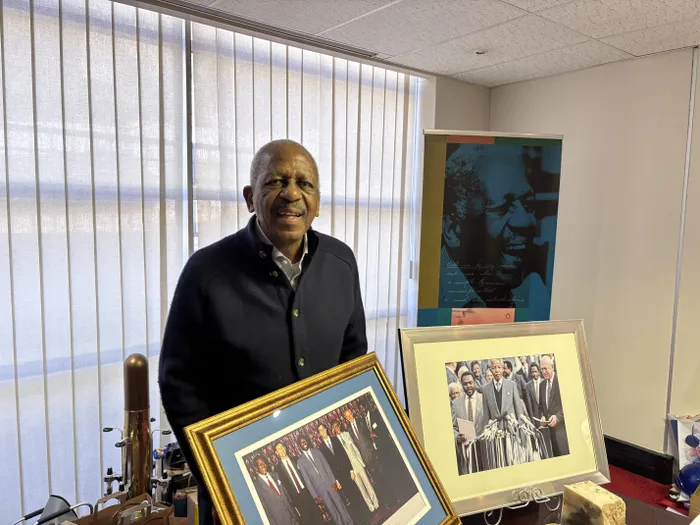My Mandela Memory | Mathews Phosa: 'The Madiba I knew'

Dr. Mathews Phosa reflects on Nelson Mandela's legacy on Mandela International Day
Image: Thabo Makwakwa
As the world commemorates Nelson Mandela International Day on July 18-an annual global tribute to the revered leader's life and legacy-veteran ANC stalwart Mathews Phosa has offered a heartfelt reflection on Mandela’s life, describing him as “the university of life” who imparted invaluable principles of leadership, unity, and perseverance.
Mandela died on December 5, 2013, at the age of 95 due to a prolonged respiratory infection.
In an exclusive interview with IOL, Phosa explained Mandela’s role as a unifying figure and a teacher whose experiences shaped not only South Africa’s liberation but also the nation's moral fabric.
“Over 35 years ago, I was a commander of the army based in Mozambique, responsible for military operations in the so-called Eastern Transvaal, Natal, and parts of the Eastern Cape.”
He detailed how he was summoned to Lusaka to meet Mandela shortly after his release from prison.
"He said to me, ‘Boy, I am so happy to meet you,” Phosa recalled. “Last week, I was in Kwanyamazane addressing a rally when I met your law partner, Phineus Mojapelo. He told me he had come to fetch me.”
“I asked, ‘What do you mean? You’re here to fetch me?’ Because I knew that if I touched down in South Africa, I could be arrested - I had been wanted. Yet Mandela insisted, ‘I am coming to fetch you.’”
Phosa described his feelings as he prepared to return home. “Thabo Mbeki gave me a British Airways ticket to fly to Mozambique. I asked who would receive me upon my return.
“Mbeki told me, ‘Don’t worry, the people who will receive you, just go home.’ I asked how he could say that, but I trusted him as a soldier—if he said left, I went left.”
As he flew back to South Africa, Phosa experienced a surge of pride. “I realised that this country was the best - it’s a beautiful country. That’s what we fought for, the freedom of this country was worth dying for.”
At the airport, Phosa recounted, “Men came to me and asked, ‘Are you Mathews?’ I said no. Then they asked, ‘Are you Fredy Phosa?’ I said, ‘Which Fredy are you looking for?’ They said they were looking for Freddy Mathews Phosa.”
He clarified, “I told them, ‘I am Freddy Makwakwa, Freddy Maputo, I was many Freddies, and they said they were looking for Fredy Maputo, and then I agreed.’
He said that because he was in exile and had a Ghanaian passport, he was asked to explain how he obtained it.
“They stamped my passport and asked where I got it. I explained I was in exile and had to have that passport.”
He described how he called his partner, Mojapelo, to fetch him at the airport, but due to a lack of cell phone communication, Mojapelo was unable to find him.
“Along the way, they told me they were taking me to Vlaakplas and that they had heard I interrogated some apartheid officials there, but they were just scaring me,” Phosa said.
According to Phosa, a few days later, Phosa and leaders like Mandela, former president Jacob Zuma, and others began negotiations that culminated in South Africa’s democratic constitution.
“We couldn’t even see our families or move freely at the time - it was so dangerous. We had to ensure negotiations started peacefully,” he recalled.
He reflected on his clandestine visits to Pretoria’s Mabopane, where he met with his wife and mother before heading to Cape Town to prepare for the negotiations for Codesa.
He stated that the apartheid government had issues with the delegation that was to represent the ANC.
“We insisted that we be part of the delegation, refusing to accept Afrikaner attempts to exclude leaders like Chris Hani and Joe Slovo. Then the acting president, former President De Klerk, agreed to let us be part of the negotiations.”
Phosa described Mandela as a “father figure” who taught them basic principles of life, negotiation, and peace.
“Standing next to Mandela at 38, as his advisor, was a privilege,” he said. “He was a university of life. He told us, ‘You need to make peace with your enemies because you already have peace with your comrades and friends. You must impose peace, whether by violence or dialogue.”
He also shared insights into Mandela’s meticulous approach to speeches. “Mandela would never read a speech unless we approved it. He wrote most speeches he delivered, but he understood that his words carried weight, and he wanted them to reflect his true message.”
Phosa highlighted Mandela’s ability to think with his head, not just his heart.
“He taught us not to think with our hearts but our heads. When the armed struggle was suspended, it was a tough time, including the collapse of initial negotiations,” he explained.
He recounted the efforts to revive negotiations through “working groups” and the formation of teams led by Cyril Ramaphosa to address issues like the constitution and the nation's future.
As South Africa continues to build on Mandela’s legacy, Phosa affirmed that “Mandela was the source of unity. His life was a testament to reconciliation, hope, and resilience. He showed us that even in the darkest times, perseverance and peace could forge a new nation.”
Reflecting on Mandela’s profound influence, Phosa remarked, “He was not just a leader but a teacher, a father figure, and a university of life itself. His principles remain our guiding light. As we celebrate his life, remember that his legacy is about building peace, unity, and a better future for all.”
thabo.makwakwa@inl.co.za
IOL Politics
Related Topics: